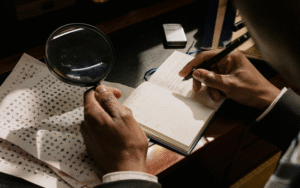“The Train Station”
It was late autumn, and the air carried a bite of impending winter. At a bustling train station in a city neither of them called home, Ella and Adrian met by chance. She was a photographer passing through for a gallery showing; he was a writer en-route to a retreat. The collision was unremarkable—her suitcase accidentally clipping his—but the conversation that followed was anything but.
Over coffee in the station’s drafty café, they talked as if they’d known each other for years. She spoke of her love for capturing fleeting moments, while he described his obsession with weaving stories out of them. They laughed at how their lives mirrored each other—both chasing dreams, both living out of suitcases, both longing for connection yet terrified of what it might demand.
When Ella’s train was delayed, they stayed for hours, watching passengers come and go, as if the world had conspired to give them this stolen moment. By the time her train finally arrived, Adrian offered to see her off.
On the platform, the air between them grew heavy with unspoken possibilities. “What if we didn’t say goodbye?” she asked, half-joking.
“I wish we didn’t have to,” he replied, sincerity in his eyes.
But they both knew the answer. Adrian’s train would leave in an hour. Ella had clients waiting in another city. Their lives, though momentarily intertwined, were heading in opposite directions.
They exchanged numbers and promised to stay in touch, but deep down, they understood the nature of promises like these—they’re made more for comfort than commitment.
In the weeks that followed, they tried. They texted, called, and shared snippets of their lives. But as miles stretched and schedules filled, the connection began to wane. Not because the bond wasn’t real, but because the timing wasn’t right.
Years later, Ella would walk past a bookstore and spot Adrian’s name on the cover of a novel. She would pause, her hand hovering over the book, and smile faintly. Meanwhile, Adrian, flipping through an art magazine in his apartment, would come across a feature on Ella’s photography. He would linger on her portrait, his mind briefly returning to the sound of her laugh.
Their lives had moved forward, yet the memory of that train station lingered—a fleeting intersection of two souls that, for a moment, felt like destiny. They never spoke again, but the memory of their connection stayed with them, not as a regret but as a quiet reminder. Sometimes, the right person appears at the wrong time, and while the love is real, life insists on pulling you forward. Their story remained unfinished, yet its impact was undeniable—proof that even fleeting moments can leave indelible marks.
Love promises everything yet often gives us glimpses rather than guarantees. Meeting the right person at the wrong time is one of life’s most profound heartbreaks. It is not the fiery devastation of betrayal or the gradual erosion of indifference. It is something quieter, sharper—a bittersweet ache that lingers because it feels both inexplicable and unfair.
This is the love that doesn’t collapse under its own weight but is stolen by forces beyond your control. It’s a masterpiece left unfinished, its beauty undeniable but incomplete. And therein lies its power—it forces us to grapple with what it means to love, to lose, and to live without the answers we crave. It’s a reminder that some connections are not meant to last but to teach, to transform, and to leave us forever wondering, “What if?”
The Cruel Elegance of Timing
When Love Becomes a Silent Witness
Timing is the unspoken architect of our lives. We like to think we are the masters of our own destinies, but timing often humbles us, reminding us how much is beyond our grasp. It doesn’t matter how perfectly someone fits into your soul if they don’t fit into your life. Careers demand attention. Personal growth requires solitude. Circumstances pull us in directions we cannot resist.
And so, love—this thing we cherish as boundless—becomes a silent witness to our inability to align. It sits there, waiting, watching, knowing it cannot intervene. This is what makes ill-timed love so excruciating: it exists in full colour, yet we’re forced to see it only in fragments.
The Haunting Beauty of What Could Have Been
What makes the “right person, wrong time” phenomenon so uniquely devastating is not just the loss of a person but the loss of a future. It’s the version of your life that will never come to fruition. You see it in dreams, in fleeting thoughts, in moments of stillness when the “what ifs” creep in.
The cruelty is that these visions are so vivid they almost feel real, yet they remain just out of reach. You can’t experience them, but you can’t quite let them go, either. This isn’t just longing—it’s mourning for something that was never truly yours but felt like it could and should have been.
The Lessons Hidden in Love’s Unfinished Symphony
Love Is Not the Answer
We grow up believing love is the solution to everything. Movies tell us it will save us, songs insist it will heal us, and stories promise it will prevail. But life teaches a harsher truth: love is not always enough.
It doesn’t matter how much you feel or how deeply you care if life demands something else from you. Careers, personal growth, family responsibilities—these aren’t villains in your story; they’re the realities that love must coexist with. Ill-timed love reminds us that relationships are not just about the heart but about context.
The Courage to Choose the Self
Letting go of someone you love isn’t a betrayal of that love—it’s an act of courage. It’s acknowledging that to hold onto someone when you are not ready, or when life does not allow, is to risk tarnishing the very connection you treasure.
This kind of heartbreak teaches you to value yourself enough to walk away, not because you don’t care, but because you do. It’s a testament to self-respect and to honoring love by refusing to force it into a shape that doesn’t fit the present.
Unfinished Doesn’t Mean Incomplete
Love that doesn’t last still transforms us. Its impermanence doesn’t diminish its significance; it deepens it. These relationships are like shooting stars—brief but breathtaking. They leave a trail, illuminating parts of ourselves we hadn’t yet discovered.
You learn what it means to truly connect. You understand what you need and what you can offer. And most importantly, you realize that love is not about its length but its depth. Some stories are short, but they are no less beautiful for it.
The Aftermath: Learning to Carry the Ache
Grieving Without Erasure
When love ends—not because it failed but because it couldn’t be—grief becomes a companion. But this grief is unlike any other; it doesn’t demand closure. It demands understanding.
You don’t have to erase the person to move forward. You don’t have to bury the love to heal. Instead, you learn to carry it, not as a burden but as a memory that shaped you. You make peace with its incompleteness, understanding that some loves aren’t meant to be resolved. They’re meant to be remembered.
Turning Pain into Presence
Heartbreak, when faced with honesty, has the power to ground us. It forces us to confront our vulnerabilities, to sit with discomfort, and to find meaning in pain. These moments of reflection can lead to profound growth.
What if this heartbreak isn’t just an ending but a beginning? What if it’s the birthplace of new perspectives, deeper empathy, and a richer understanding of yourself?
Pain is not the enemy; it is the teacher. It reminds you that you are alive, that you are capable of love, and that you are brave enough to risk it again.
The Legacy of Ill-Timed Love
Some loves are not meant to be lived—they are meant to be felt. They exist not to anchor us but to awaken us. They remind us of our capacity for connection, for passion, and for heartbreak.
The right person at the wrong time is not a failure. It’s a testament to life’s complexity and love’s unpredictability. It’s a story that doesn’t have a neat ending but leaves you with a greater understanding of who you are.
So, carry this love with you—not as a regret but as a treasure. Let it remind you that even in its impermanence, it was real. It mattered. And it always will. This is the gift of ill-timed love: it opens your heart and your mind, even as it breaks you. It teaches you to honor what was, while stepping into what could be. And it leaves you with this undeniable truth: love, no matter how brief, is always worth it.




